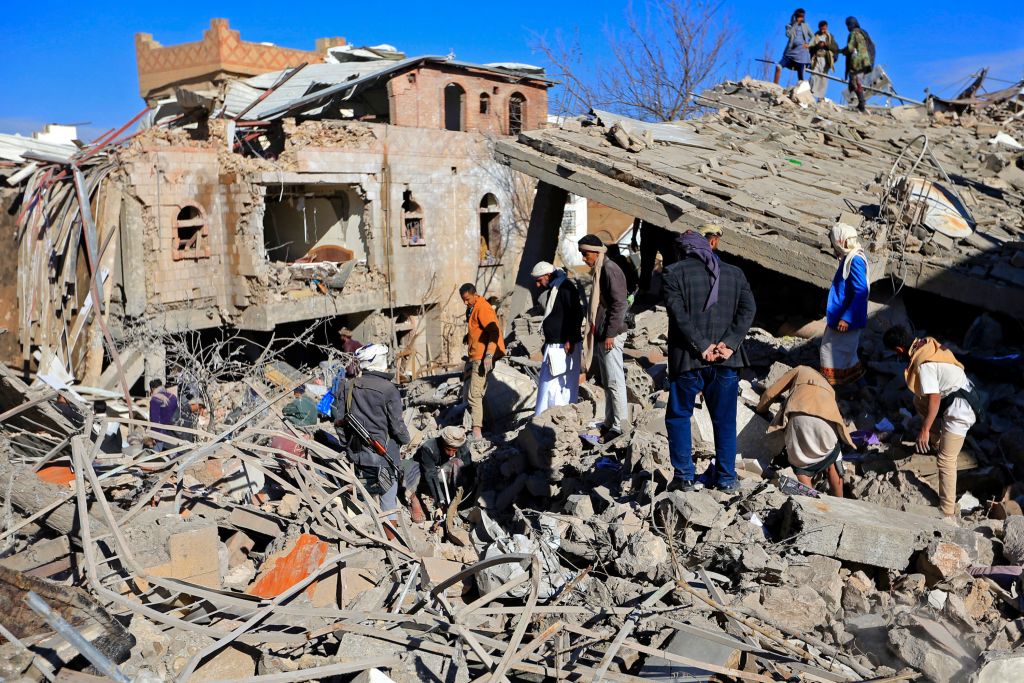New attacks show war in Yemen could escalate further
Posted By Amin Saikal on January 25, 2022 @ 06:00

The Yemen conflict is now a decade old. It keeps taking on a wider dimension, with no relief in sight for the suffering Yemeni people. All peace-brokering efforts have failed to produce any tangible results, and this is likely to remain the case for as long as no regional consensus exists between Saudi Arabia and Iran, as well as between Iran and the United States.
The recent attacks [1] by Iran-backed Houthis on Abu Dhabi that killed three people [2] and the Saudi-led Arab coalition’s retaliatory strikes [3] on Sanaa, Yemen’s capital, that killed scores, underline not only the intractable nature of the Yemen war but also its potential to become a regional fireball.
The conflict commenced as an internal power struggle among the multi-ethnic, tribal and sectarian Yemeni population following the ousting of dictator Ali Abdullah Saleh in the wake of the ‘Arab Spring’ or pro-democracy uprisings in the Arab world. Saleh had ruled North Yemen from 1978 until 1990 and then a united Yemen from 1990 until 2012.
However, Saleh’s toppling opened the way for the two Persian Gulf powers to intensify their sectarian and geopolitical rivalry for regional influence. The predominantly Shia Islamic Republic of Iran threw its weight behind the friendly sectarian Houthis. The Kingdom of Saudi Arabia, backed by its allies in the Gulf Cooperation Council, most importantly the United Arab Emirates (as well as the US, which has sought to eliminate al-Qaeda cells in Yemen), supported Saleh’s Sunni replacement, President Abdrabbuh Mansur Hadi. The Houthis’ success in driving Hadi out of Sanaa in 2014 posed a formidable security challenge to the new Saudi king, Salman bin Abdulaziz, who succeeded his politically nuanced half-brother, Abdullah, in January 2015.
The king’s powerful young son, Mohammad bin Salman, who rapidly emerged as the kingdom’s de facto ruler, decided to tackle Iran’s expanding influence in Saudi Arabia’s backyard (Yemen) and indeed in the region. Within less than three months of his father’s assumption of the throne, he commenced, with the UAE’s full participation, a Saudi-led Arab coalition military operation against the Houthis.
The war has devastated the Yemeni people. It has generated an unspeakable humanitarian crisis. Close to 400,000 people have so far been killed because of direct combat operations, involving relentless Saudi-led coalition air raids, and related indirect causes, such as hunger and preventable diseases. A United Nations Development Programme report [4] released in November estimated that by the end of 2021, a good percentage of the civilians killed would have been children under the age of five. The UNDP’s administrator, Achim Steiner, said [5] ‘we believe that the number of people who have actually died as a consequence [of the] conflict exceeds the numbers who have died in the battlefield’. More than half of Yemen’s some 30 million people have become destitute.
Upon assuming office in 2021, US President Joe Biden made a number of policy announcements in relation to the Middle East. Among them, he declared a halt to US support for the Saudi-led campaign in Yemen, which his predecessor, Donald Trump, had backed to the hilt, as well as the stopping of the sale of American offensive weapons to Saudi Arabia and the UAE. He called for an end to the Yemen war, removed the Houthis from the US list of terrorist organisations, and undertook to revive the July 2015 multilateral Iran nuclear agreement known as the Joint Comprehensive Plan of Action or JCPOA. He also committed his administration to the promotion of human rights and democratic values as a priority in the region.
However, one year on, Biden has not followed through with any of these measures, except seeking the JCPOA’s resurrection. Faced with mounting domestic problems and the strategic consideration to confront America’s adversarial powers, Russia and China, and with Middle Eastern regional complexities, he has found it expedient to pursue America’s traditional policy approach to maintain close ties with oil-rich Saudi Arabia and its Arab partners, and its strategic partnership with Israel. US arms sales have continued, as have the Saudi-led coalition’s operations in Yemen. Biden’s initial emphasis on human rights and democracy promotion has also subsided in favour of sustaining the status quo.
The only area where he has made a push is that of the JCPOA, but without any substantial progress so far. The indirect US–Iran negotiations in Vienna have become bogged down over whether Washington should first lift all the JCPOA-related sanctions on Iran or the latter should first fully comply with the agreement. A failure to reach a compromise in the next few weeks could spell the end of diplomacy, potentially opening the arena for use of force by the US or Israel, both of which have repeatedly said that they will never allow Iran to become a military nuclear power.
The Houthis’ claim of the recent attacks on Abu Dhabi has resulted in intensified Saudi-led retaliatory bombardments, including the targeting of a Houthi prison at the cost of dozens of lives. The UAE has now asked the Biden administration to reinstate classification of the Houthis as a terrorist organisation. As the situation stands, the prospects for an end to the Yemeni carnage and devastation look very bleak. Yet, for humanity’s sake, there is a need for consistency in the American approach and serious international effort to urgently move all the parties in the conflict towards a viable political settlement of the Yemeni crisis.
Article printed from The Strategist: https://www.aspistrategist.org.au
URL to article: https://www.aspistrategist.org.au/new-attacks-show-war-in-yemen-could-escalate-further/
URLs in this post:
[1] attacks: https://www.smh.com.au/world/middle-east/ballistic-missiles-intercepted-over-abu-dhabi-after-newspaper-warning-20220124-p59qtu.html
[2] killed three people: https://www.sbs.com.au/news/three-killed-in-heinous-houthi-drone-attack-near-abu-dhabi/53317d49-ebe9-451c-96aa-452369cf2e36
[3] retaliatory strikes: https://www.france24.com/en/middle-east/20220121-dozens-killed-in-air-strike-on-prison-in-yemen
[4] report: https://news.un.org/en/story/2021/11/1106362
[5] said: https://www.aljazeera.com/news/2021/11/23/un-yemen-recovery-possible-in-one-generation-if-war-stops-now
Click here to print.